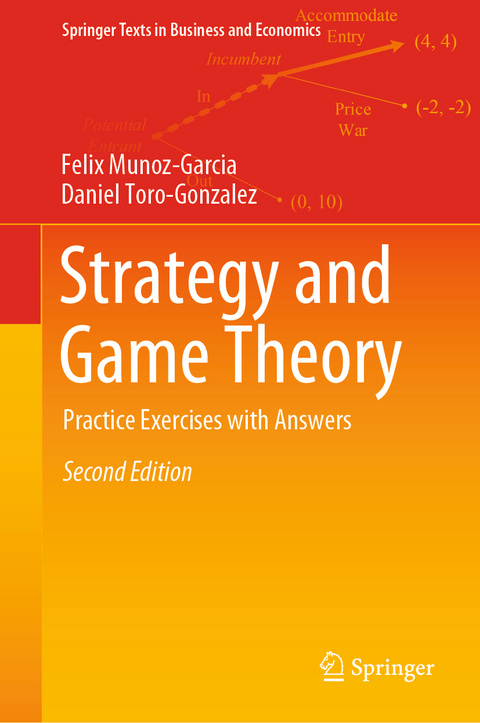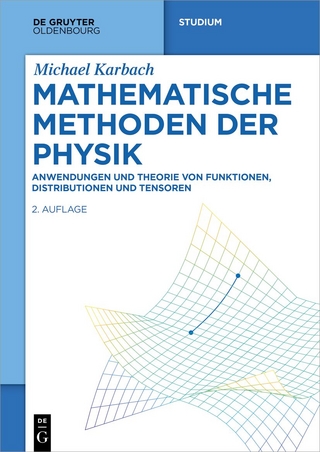
Strategy and Game Theory
Springer International Publishing (Verlag)
978-3-030-11901-0 (ISBN)
The first six chapters cover complete-information games, separately analyzing simultaneous-move and sequential-move games, with applications in industrial economics, law, and regulation. Subsequent chapters dedicate special attention to incomplete information games, such as signaling games, cheap talk games, and equilibrium refinements, emphasizing common steps and including graphical illustrations to focus students' attention on the most relevant payoff comparisons at each point of the analysis. In addition, exercises are ranked according to their difficulty, with a letter (A-C) next to the exercise number. This allows students to pace their studies and instructors to structure their classes accordingly. By providing detailed worked-out examples, this text gives students at various levels the tools they need to apply the tenets of game theory in many fields of business and economics.
The second edition of the text has been revised to provide additional exercises at the introductory and intermediate level, expanding the scope of the book to be appropriate for upper undergraduate students looking to improve their understanding of the subject. The second edition also includes a new chapter devoted entirely to cheap talk games. Revised to appeal to a larger audience of instructors and students, this text is appropriate for introductory-to-intermediate courses in game theory at the upper undergraduate and graduate levels.
Felix Muñoz-Garcia is an Associate Professor in the School of Economic Sciences at Washington State University. His research focuses on the areas of microeconomics, industrial organization, and game theory, with applications to environmental regulation under incomplete information and firms' entry-deterring practices in polluting industries. He received a Ph.D. in Economics from the University of Pittsburgh in 2008. He has published in the Canadian Journal of Economics, Theory and Decision, Journal of Regulatory Economics, International Journal of Industrial Organization, and Journal of Environmental Economics and Management, among others. Daniel Toro-González is an Associate Professor in the School of Economic and Business at Universidad Tecnologica de Bolivar. His research is in industrial organization and econometrics, with applications to technology adoption, transportation, and the food industry. He received a Ph.D. in Economics from Washington State University in 2012. He has published in the Journal of Agricultural and Resource Economics, Journal of Agricultural and Food Industrial Organization, and The B.E. Journal of Macroeconomics.
Chapter 1: Dominance Solvable Games.- Chapter 2: Pure Strategy Nash equilibrium and Simultaneous-move games with complete information.- Chapter 3: Mixed Strategies, Strictly competitive games, and Correlated Equilibria.- Chapter 4: Sequential-move games with complete information.- Chapter 5: Applications to Industrial Organization.- Chapter 6: Repeated Games and Correlated Equilibria.- Chapter 7: Simultaneous-move games with Incomplete Information.- Chapter 8: Auctions.- Chapter 9: Perfect Bayesian Equilibrium and Signaling games.- Chapter 10: Cheap Talk Games.- Chapter 11: More advanced signaling games. Index.
| Erscheinungsdatum | 29.05.2019 |
|---|---|
| Reihe/Serie | Springer Texts in Business and Economics |
| Zusatzinfo | XIII, 529 p. 374 illus., 219 illus. in color. |
| Verlagsort | Cham |
| Sprache | englisch |
| Maße | 155 x 235 mm |
| Gewicht | 967 g |
| Themenwelt | Mathematik / Informatik ► Mathematik ► Angewandte Mathematik |
| Mathematik / Informatik ► Mathematik ► Wahrscheinlichkeit / Kombinatorik | |
| Wirtschaft ► Volkswirtschaftslehre ► Mikroökonomie | |
| Schlagworte | advanced signaling • Bayesian equilibrium • complete information • Game Theory • Incomplete Information • mixed strategies • Nash Equilibrium • sequential move • simultaneous move |
| ISBN-10 | 3-030-11901-7 / 3030119017 |
| ISBN-13 | 978-3-030-11901-0 / 9783030119010 |
| Zustand | Neuware |
| Haben Sie eine Frage zum Produkt? |
aus dem Bereich


